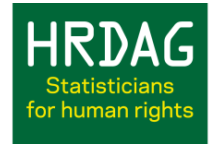Who is the Human Rights Data Analysis Group?
We are data scientists who use statistics to advance human rights and justice. We are nonpartisan and nonprofit. We seek opportunities where the debate hinges on questions of fact. Our work helps prosecutors, journalists, officials, and grassroots activists advocate for police reform, justice, and accountability for human rights abuses. We are a trusted resource for the United Nations, truth and reconciliation commissions, and international criminal courts.
We show the world how to use data science for good.
Criminal Justice Reform
HRDAG’s analysis and expertise is critical to deepening the national conversation about police violence and criminal justice reform in the United States. This work began in 2015, when we estimated undocumented victims of police violence, relying on the same methodological approach and expertise we’ve tested internationally in war crimes trials for the past three decades. Shortly afterward, we examined “predictive policing” software, and demonstrated the ways that racial bias is baked into the algorithms. Following our partners’ lead, we next considered the impact of bail, and found that setting bail increases the likelihood of a defendant being found guilty. We then broadened our investigations to examine the risk assessment tools that judges use to make decisions about pre-trial supervision, and we found evidence of racial bias in the tools. Most recently we have returned to considering the challenges of documenting police violence.
Police Violence
Violence committed by police officers in the United States is paradoxically highly documented and incompletely documented. HRDAG frequently encounters this situation in our work—some victims’ stories are told by many sources, while other victims’ stories are rarely, if ever, told. This is the crucial gap that statistics can fill.
In 2015, the US Bureau of Justice Statistics concluded that two federal efforts to document deaths that occur during arrest were woefully incomplete. Their analysis relied on the same statistical methods HRDAG’s team has been using internationally for decades, so we examined their approach, considering various assumptions required by the method. This work resulted in an essay published in the UK-based literary journal Granta, “Violence in Blue,” written by our director of research Patrick Ball, which concluded that one-third of all Americans killed by strangers are killed by police. Following the murder of George Floyd by Minneapolis police officers on 25 May 2020, Patrick refreshed the article with a new introduction, writing, “This cannot be acceptable in democracy.”
Most recently, HRDAG has been working with several partners across the United States to process and make sense of caches of documents describing interactions with police. These partners include the Invisible Institute in Chicago, ACLU-Massachusetts, Innocence Project New Orleans, and Kilometro Céro in Puerto Rico.
In November 2021 we were deeply honored to receive the Thorolf Rafto Memorial Prize. The Rafto Foundation, an international human rights organization, awards the prize to a person or organization distinguished for its work toward human rights and democracy. They produced this short video: featuring HRDAG's work with the Invisible Institute.
How can you help advance the critical work of the Human Rights Data Analysis Group?
HRDAG believes that truth leads to accountability. Our work with partner organizations in the United States and worldwide helps these groups to work with incomplete, highly imperfect data in order to illuminate patterns and thereby understand the human rights abuses that have been committed. We use statistical science to answer human rights questions, and press for the advancement of human rights, justice and accountability.
We ask you to consider making a gift to HRDAG to help support this work.
Questions? Feel free to contact HRDAG, info@hrdag.org, and we'll get you the answers you need.
HRDAG is a nonprofit project of Community Partners®.
